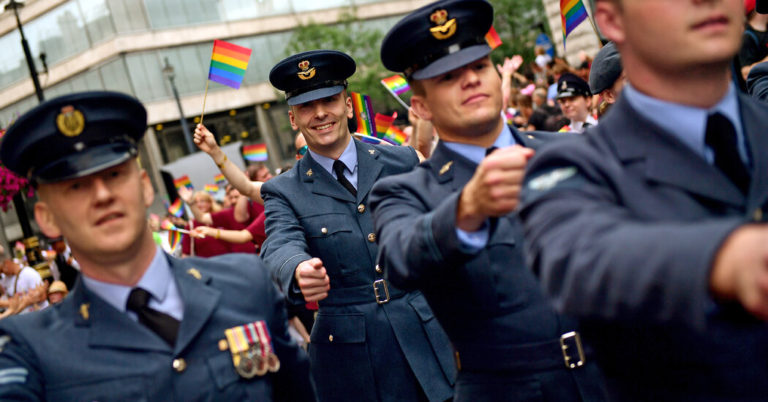

LONDON — For decades, L.G.B.T. members of Britain’s military were systematically dismissed from the ranks and stripped of their medals. Now, after years of campaigning by those targeted by the policy, the government has outlined a pathway for them to get their medals back.
The defense ministry, which has acknowledged that the practice was “wrong, discriminatory and unjust,” said in a statement on Tuesday that it was taking a further step in addressing that injustice.
Annabel Goldie, a minister of state in the Defense Ministry, said it was “deeply regrettable” that some members of the armed forces had been treated “in a way that would not be acceptable today” because of their sexual orientation. “I am very pleased now to be in a position to address this wrong and to invite any personnel affected or, in some circumstances, the families of those who are deceased to apply to have their medals returned,” she said in a statement.
The military has not released figures on how many people were affected before Britain lifted a ban on gay people serving in the military after the European Court of Human Rights ruled in 2000 that the policy violated basic human rights.
Until then, military personnel could be dishonorably discharged from service and stripped of their medals for their sexual orientation.
Some were also convicted under legislation that outlawed homosexual acts. Even as laws in the nation gradually changed, gay military personnel could still be jailed until 1994. Homosexual acts were only decriminalized in the country beginning in 1967.
“Today, L.G.B.T.+ veterans are finally beginning their journey back to the military family,” Fighting With Pride, a group that advocates for military personnel, said in a statement.
The group added that it looked forward “to a better future for them, where they are recognized for their service, their health needs are supported and they are recompensed for the wrongs of the past.”
The reversal comes after Joe Ousalice, a Falklands war veteran, campaigned for the return of a medal taken from him when he was forced out of the Royal Navy in 1993 for being bisexual.
Mr. Ousalice was a radio operator in the Navy for 18 years and also served in the Middle East and Northern Ireland.
He recalled the moment when an officer cut his medal for long service and good conduct from the chest of his uniform with a large pair of scissors.
“It was devastating,” he told the BBC last month.
The military returned his medal last year after nearly three decades. And although he told the BBC he was “over the moon” to have prevailed in his struggle, he said it was “a shame that it’s taken 27 years to get it.”
His fight, however, paved the way for the new policy that was outlined in detail on Tuesday.
That policy will allow anyone who was dismissed from service for their sexual orientation and had their medals revoked to have their case considered by the defense ministry. Families of deceased veterans who were discharged from military service on those grounds may also apply for the return of their medals.
Military personnel who were convicted for sexual offenses that have since been decriminalized can apply to the government to have the charges officially revoked and then can apply for their medals to be restored. This avenue does not apply in the case of deceased veterans.
Rights groups welcomed the new policy and said it was important to ensure that the government address broader discrimination against L.G.B.T. veterans.
Prime Minister Boris Johnson said the change addressed a “historic wrong.”
“Those who serve in our Armed Forces deserve every recognition for their service,” he wrote on Twitter. “It was a very great injustice that this was denied to some members simply because of their sexuality.”